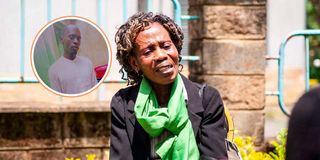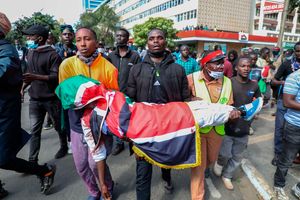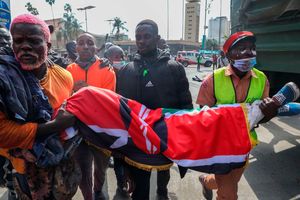
Joseph Mwangi whose son Kenneth Mwangi Njeru (inset) was killed in the 2024 anti-government protests, during a commemoration event at The Kenya National Theatre in Nairobi on May 4, 2025.
For Joseph Mwangi Njeru, life has been a rollercoaster ride since last year’s anti-tax protests turned his world upside down.
The death of their son during the demonstrations against the Finance Bill in June 2024 shattered the hopes they had placed in him.
Kenneth Njeru, 21, had just finished his Form 4 studies and was about to start the next stage of his studies.
However, while waiting for admission to college and raising funds, his father secured a welding job for him. This was a turning point not only to their son but to the family as well.
Being the first born in a family of four, Njeru had assured his parents that he would use his salary to improve the lives of his parents and his brother.
His father, 50, who is a jua kali artisan in Nairobi, recalls on the fateful day, June 25, 2024, when youths broke into Parliament, he talked with his son just minutes before he was killed.
Mr Njeru recalls in his last conversation with his son, 21, he tried to convince him not to go to the streets, but with the influence from his friends, they travelled to the city centre.
“They met and said that they are going to fight for their rights. That was the last time that I saw my son alive,” the father of four says overcome by grief.
“The following day, I found him lifeless at Nairobi Funeral Home (formerly the City Mortuary).”
Mr Njeru recounted the struggles he has had to endure to provide for his family only for the one boy who was almost getting a lucky break in life to be felled by bullets while championing for a better life for Kenyans.
“I buy water in this city. I pay for toilet and the house separately in Sinai. Despite all that effort, my son was shot and killed during demonstrations. He was my hope as the first born,” he says.
While the family believed that their son would be an investment to take care of them as they grow older, that his first salary would be used to buy his coffin was even more painful.
“What angered me most is that his first salary is what I used to buy the coffin. The first salary of my son did that work,” he says.
In the hustle and bustle of Nairobi, Mr Njeru says he raised his son single-handedly and the news of his death means his sweat was in vain.
Since then, the small amount of money that Mr Njeru gets is used to take his wife for medication, after developing a chronic disease just after the death of their son.
“She is diabetic. I have been buying medicine to her. I have the responsibility of taking care of her and I must buy the drugs every month and settle other bills.”
Inasmuch as he accepted the death of his son, Mr Njeru is asking the government to compensate him by paying school fees for their remaining son.
“It will be better if the government compensate me with money so that I can use it to pay school fees for my son. He is currently in Form Two and I have big burden on my shoulder for now,” Mr Njeru said.
Mother demands justice
Phoebe Akumu cries when she hears some MPs claim that the country has moved on from what happened during the occupy Parliament protests.
Her son Kevin Odhiambo, who was 16, was killed during the demonstrations just after going to pick a book from one of his classmate who had asked him to meet in town.
As she struggles to speak about the moment that she was informed of Odhiambo’s death, Ms Akumu’s wish is to meet the police officer who killed her son.
“I just want justice to my son. I will be a happy person to receive justice for him because he has left a huge gap that I don’t know how to fill it. I want to know who killed me, to tell me why he killed him,” she said.

Phoebe Akumu, whose son Kevin Odhiambo (inset) who was killed in the 2024 anti-government protests, during a commemoration event at The Kenya National Theatre in Nairobi on May 4, 2025.
It was a sudden incident that she is yet to come to terms with, baring the fact that her son was not taking part in demonstration.
“He never wanted to be in a huge crowd. If you could not find him at home, you would find him inside the church. He used to dance in the church. It was very easy for his friends looking for him to trace him inside the church, spending time with the priest,” Ms Akumu says.
Odhiambo had just started his electrical engineering course in one of the institutions in Ngong before his life was cut short.
He had promised his mother to change his living standards from the slums where she has raised them from as a widow.
Ms Akumu says her husband died just a day before she gave birth to Odhiambo, which she describes as a difficult journey, as she has been washing clothes in estates to put food on the table.
Ahead of commemoration of the first anniversary since the anti-government protests, the families which were affected together with human rights activists have launched a campaign to push the government to compensate victims and take action against the police officers who killed the young people.
The 21 families who converged at the Kenya National Theater in Nairobi on Sunday launched the petition to collect more than one million signatures from Kenyans in demand f justice to the affected families.
In pursuit of justice for their children, some of the parents said that they will not keep silent until the people who were implicated are arrested and face the law.
“You left me with no last words, but only receiving a call and finding you lifeless,” Gullian Munyao, mother to Rex Masai said.

They have asked President William Ruto to reaffirm his commitment in to the rule of law, accountability for murderers and justice for the victims of extrajudicial killings.
“Arrest and prosecute killer cops, and their commanders who directed and executed the murder of innocent, peaceful protesters. Provide compensation to murdered victims’ families and families of those who suffered injuries and destruction of property,” the petition reads.
According to a report by the Independent Police Oversight Authority, at least 60 protestors were killed by security agents during the violent anti-tax protests. None of the rogue security officers has been sanctioned for these killings.
Hussein Khalid, who is the CEO of one of the lobby groups, Vocal Africa, said that there is no any indication from the government to compensate the victims.
He also questioned how the government has moved with speed in handling the case of the late Kasipul Member of Parliament, Charles Were.
“The state, including leaders spoke so openly, so loudly about one individual who was shot and killed, yet to this date, absolutely nothing has been done to ensure the killed protesters get justice. It just shows how unequal our society is,” Mr Hussein said.
Mr Hussein said the move seeks to bring justice not only you the people who died during the anti-government protests but even who died under unclear circumstances in the hand s of police officers.






